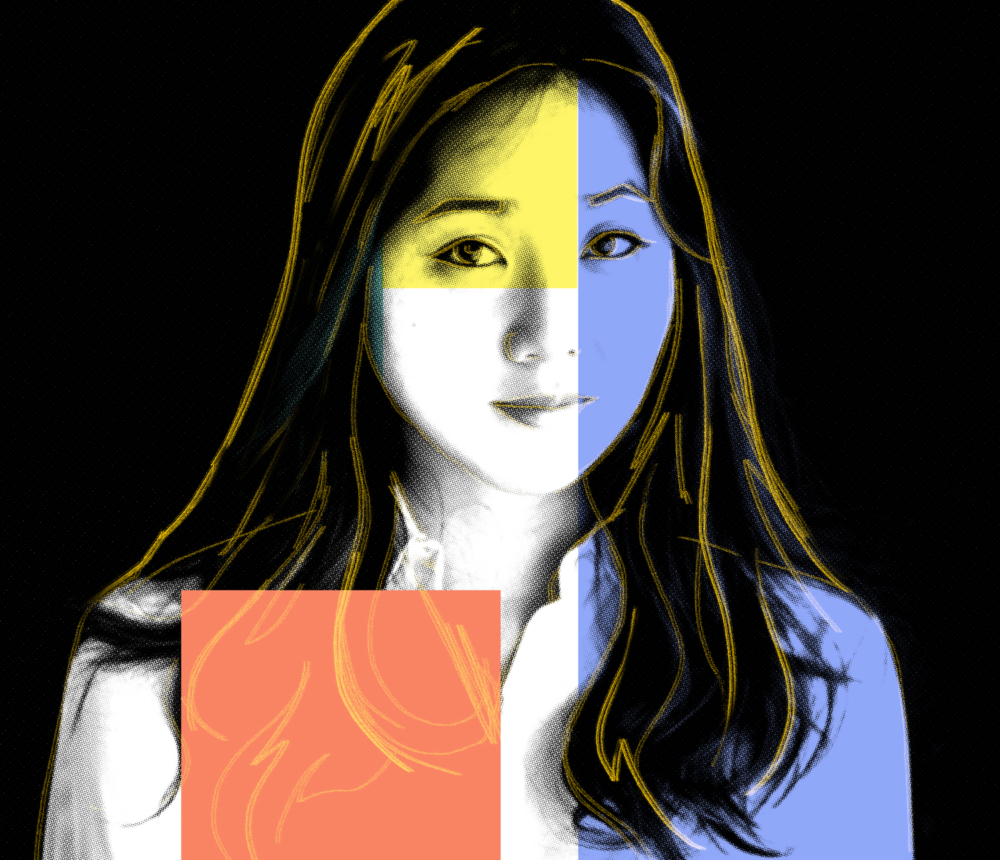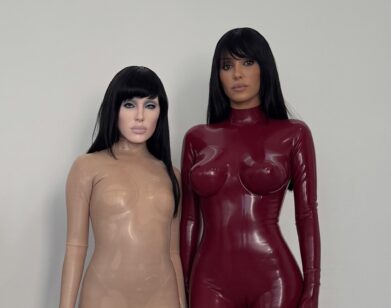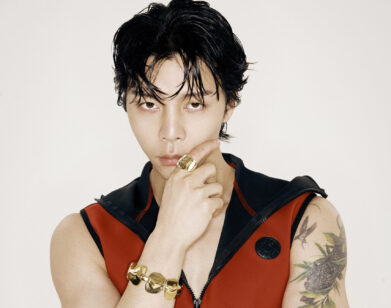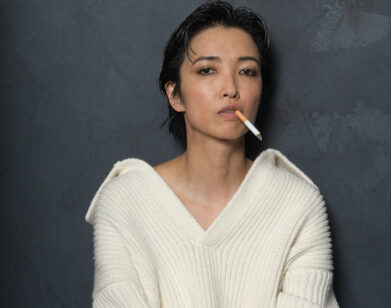Frances Cha Goes Beyond the Gloss

Art by Jack Vhay.
Frances Cha’s first novel, If I Had Your Face, though not autobiographical, parallels her life in ways as striking as her turns of phrase. Cha grew up between the United States, China, and a South Korean province whose name (Gyeonggi-do) translates to the “province surrounding Seoul.” Literally and figuratively, Seoul has had a gravitational pull on Cha since youth, when she devoured American novels on the periphery of the capital city which is now the setting of her exquisite fiction debut. Cha, who began writing professionally as a reporter for CNN Korea and Hong Kong, has centered her novel around four female narrators, with interlocking stories about the agony of potential motherhood, escaping unsavory pasts, and the inevitable commodification of physical beauty under capitalism. The stories stick like glass in skin, like an obsession with a favorite pop star. Cha makes us feel what a woman living in the most populous city in the world must feel: desperate to polish and perfect herself under so many perceptive eyes. Cha recently spoke to me from New Jersey, where she is in quarantine with her husband and children, about situating herself in fiction, Korean collectivism vs. American individualism, and writing about one culture for another after growing up between the two.
———
BESSIE RUBINSTEIN: It was soothing to read a novel that’s connected between two poles: New York and Seoul. The novel does work for a transnational audience—exploitative men taking advantage of an exploitative economy, is unfortunately something a global audience can understand. If I Had Your Face is your debut; were you thinking at all about how you wanted to situate yourself as a transnational author with its release?
FRANCES CHA: Yeah. It’s crazy, how the world has looked to Korea right now as this success story in containing the virus. I didn’t write this book as an indictment on Korean society, although it has been received as such by some readers. I very much love Korea and Korean society and the culture, and just wanted to tell these stories. Virus containment was effective in Korea because of their culture and the mentality of the population as well as recent history. Korea always thinks of itself as an underdog. It has been technically at war with North Korea. Now there’s a temporary pause, but Korea is still in that mentality. So regrouping in a time of crisis as a nation is immediate and it’s something that every citizen responds to. It’s been interesting to contrast that with the very individualized freedom-focused response of the American population, which is precisely why this hasn’t worked. Also, the technology advancement. Korea is the world’s most wired country with the highest smartphone penetration—you can to get the word out almost instantaneously. In America, there’s so much choice, so it’s hard to get one message across all channels to reach the majority of the population. Because I’m home with my Korean in-laws, I’m watching Korean news. Their response is very, very different from what’s happening here. Debuting a novel that’s set in modern Korea is really unusual in the American publishing scene. Fictive books set in Korea have generally been historical novels, so you don’t really see the current landscape of technology and kind of the futuristic elements: the market, and how young people are navigating that space. Which again, is very superlative in both good and bad ways because in the world’s most educated country (according to the World Economic Forum) that leads to a lot of competition. So you have the world’s highest household debt, because people spend their money on education for their children, which really stresses them out. So that then contributes to the highest suicide rate among developed countries, internet addiction rates, and gaming addiction rates.
RUBINSTEIN: It’s interesting that readers picked up on anti-Korean sentiment above all else, because you also snuck indictments of America into the book. Like when Miho learns about America’s healthcare system, and can’t believe it—she thinks she’s getting false information. So on the flip side of the coin, do you feel like there is also a Korean misunderstanding of America as more developed than it actually is?
CHA: For sure. I spend three months out of the year in Korea. I only moved to New York about five or six years ago. So I constantly, immediately see contrast with different things that are so convenient in one country and so hard to obtain in the other country. I’m thinking of, for example, birth control, which was something I mentioned in one of the storylines. It’s stacked on top of every pharmaceutical counter in Korean. You can buy boxes of it without having to show any ID. In the States, I have not visited the OB in the States ever, because it’s so hard to get an appointment. Other than my children being born. It’s ridiculous.
RUBINSTEIN: Well, yes, because we love baby-making, right? But God forbid you control your ability to have them.
CHA: Another thing is just the general convenience of technology being embedded into everyday life. It’s seamless in certain ways in Korea.
RUBINSTEIN: You wrote this book in English. So would you say you’re positioning your perception of these societal differences to speak to an American audience, a Korean audience, or a transnational audience?
CHA: I wanted to have an American reader with absolutely no context of Korea be able to not be alienated by the references and the setting. So I tried to contextualize without explaining things, including the language. I wouldn’t explain what a Korean word is necessarily, but hope that they could glean that from context and dialogue. But I also wanted it to be for people like me and my friends. A lot of us have spent a lot of time being schooled in Western countries, and when I’m talking to my closest friends, every sentence is a mix of words in both languages. I wanted them to read the book without feeling like this was not meant for them, not some outsider. I actually included a lot more Korean words, but then I read a book that was written in English but set in Latin American country and it included a lot of Spanish. Because I don’t speak Spanish, it pulled me out of the suspension of disbelief. After that, I went back and kind of edited out some Korean words. But a lot of them are still there.
RUBINSTEIN: A lot of the times when a book that is attempting to include perspectives from two national identities comes out, the conversation can end up exploding around authenticity and fetishism. I’m thinking about that book, The Woman Warrior, that came out in the 20th century, and how the conversation about that book became about whether or not she was packaging Chinese culture for a Western audience. Is that something you had in mind while writing, trying to avoid identity politicking?
CHA: I did not want to speak on behalf of a country. I’m trying to tell a story, and make that story as authentic as possible at the granular level. But I didn’t mean it for it to be some grand social indictment. But if it ends up reading that way for readers, then I have no control over. Because if you take certain facts to be an indictment, then perhaps it is. The same is true for…I don’t know if you’ve seen Parasite.
RUBINSTEIN: Of course.
CHA: I’ve watched interviews with Bong Joon Ho, and because this is the first Korean film to win an Oscar, it’s like, “How do you feel about your film representing Korea?” And he’s like, “I never meant for it to represent Korea. I just wanted to tell a story about two families.” Yet it’s taken as this very damning criticism of social mobility, which it is. Though that wasn’t necessarily his intention.
RUBINSTEIN: And that reception ends up saying not so much about the film, but more about its audience and their condition.
CHA: Very true. And Parasite is especially interesting, because the Oscars happened right before coronavirus. So first there was the celebration of a Korean film winning. Unprecedented. Then when South Korea had the highest number of cases after China, and there was this anti-Asian wave sweeping America. Then suddenly now it’s, “South Korea did this to contain the virus, and we must follow.” That’s now the standard.
RUBINSTEIN: I think that when another culture is story-told to us, we can appreciate it as craft and then separate that identification from our real-life behaviors when it comes down to it.
CHA: Completely.
RUBINSTEIN: In the book, you talk about the aversion to the number four being a superstition in Asian countries. But you do use a motif of repeating fours and also there’s the quartered structure of the book—four narrators. So I was wondering where the logic was in that, in that story.
CHA: That’s really funny, because I remember reading Amy Tan talking about The Joy Luck Club, and how there are four mothers, four daughters in that book. Exactly the same thing. Four is superstitious. I personally am very superstitious. Four, I really hate. If we go to a hotel and I’m given a room with four in it, I ask to switch. But this was unintentional. It was the same for Amy. She had no idea she was doing that. I actually had five narrators, and one storyline was cut completely after I had written it. She is going to be my next book.
RUBINSTEIN: You spent time in the US, China, and Korea as a kid. Did your experience with shifting language as a child work itself into your writing?
CHA: Yes, absolutely. I was eight when I moved to Asia—I was born in the States. In Hong Kong, everyone around me was speaking English, but the locals speak Cantonese. And my reading experience was very divided. I would read in Korean because I was going to a public Korean school, and experiencing life in Korea. But then my escapism would be to read novels in English—it would take me about an hour and a half on the train to get to a bookstore that sold English books, and I would stock up. I mostly just pleasure-read Korean comics. There were these great comic book cafés around where I was. I had a lot of training writing for CNN in English in Korea; even though I was a Korean person in Korea, functioning in my daily life by speaking Korean, and interviewing everyone in Korean, I would write about it from the point of view of an international audience who doesn’t necessarily know anything about Korea. That was perfect training ground for writing fiction, because every single day I was contextualizing with specifics for the reader. Reporting also helps you not be pressured with editing and cuts, because everything you pore over is edited and gone in like two hours. And every day, you’re doing that several times a day for years, so that eventually you’re completely numb.
RUBINSTEIN: You establish this really nuanced hierarchy of sex work and room salon girls in Seoul. So it did seem like you had to take a journalistic sensibility to writing about those kinds of negotiations and that way of existing. Was there a base of research you were drawing upon? I know you included a disclaimer that nothing in the book is anybody’s actual story, but…
CHA: I did do a great deal of research for the different storylines. Specifically, the plastic surgery storyline: I visited clinics and hospitals, and received consultations about jaw surgery. The first time I encountered room salons, I wasn’t researching for a novel. But I thought they were fascinating, so I started to look into them and ask my guy friends to take me out. They thought I was annoying. I would be asking them to bring me, and call them for fact checks. They go for professional purposes—they bring clients regularly. So they were horrified that I was asking these detailed questions. I watched documentaries, read news articles, read blogs by room salon girls, and visited them, too.
RUBINSTEIN: If I Had Your Face is deeply interested in family shaping you long after you leave them. When Wonna sees that her uncle is as miserable as she is: she says something like “He’s one of us.” Do you think that people carry their families with them—that we’re more molded by family than we think we are?
CHA: Absolutely. Every single decision that I make in my life is shadowed by my family. My mom is alone in Korea right now. My brother is there, but he’s married and doesn’t live with her. That’s one of the biggest preoccupations of my life: I worry about her the minute I wake up and right before I go to sleep every single day. And my extended family has directly impacted all my decisions.
RUBINSTEIN: Are big, sprawling family narratives something you’re drawn to in the work that you read?
CHA: I’ve been religiously reading the works by other debut writers, and I’m just floored by how beautiful and personal their essays are, like Chelsea Bieker’s Godshot. She just had this incredible essay in the Paris Review about how her mother left her father. He used to beat her. And she was the one who phoned her grandparents to come and get her and her mother. Just incredible. And C Pam Zhang. Zhang has a book out: How Much of These Hills is Gold, and she also has a story in The New Yorker about her father…she discovered her father’s body that had been decomposing for days in his office, and was tracking family storylines from Tiananmen on. I think that’s why writers become writers. They take things very much to heart, like what happened to their family. Often, tragic things happen, especially for immigrants. But they don’t process it as tragedy. So the writers of the next generation, they have processed it this way: by writing about it.
RUBINSTEIN: Obsessive archivers, just like Miho.
CHA: Yes, exactly.
RUBINSTEIN: Speaking of obsessive, the K-pop industry has a substantial cameo in the novel. Do you count yourself as part of that world?
CHA: Every single week, whatever Ara did in that chapter, I was doing. The K-pop stuff comes from a personal background. And that fandom…is very intense.






